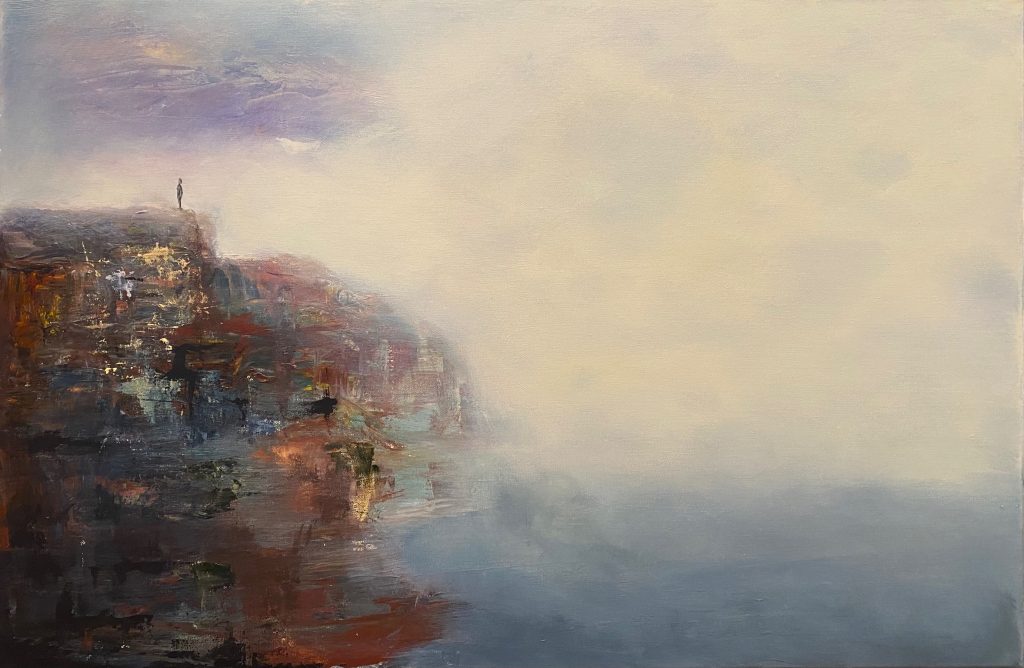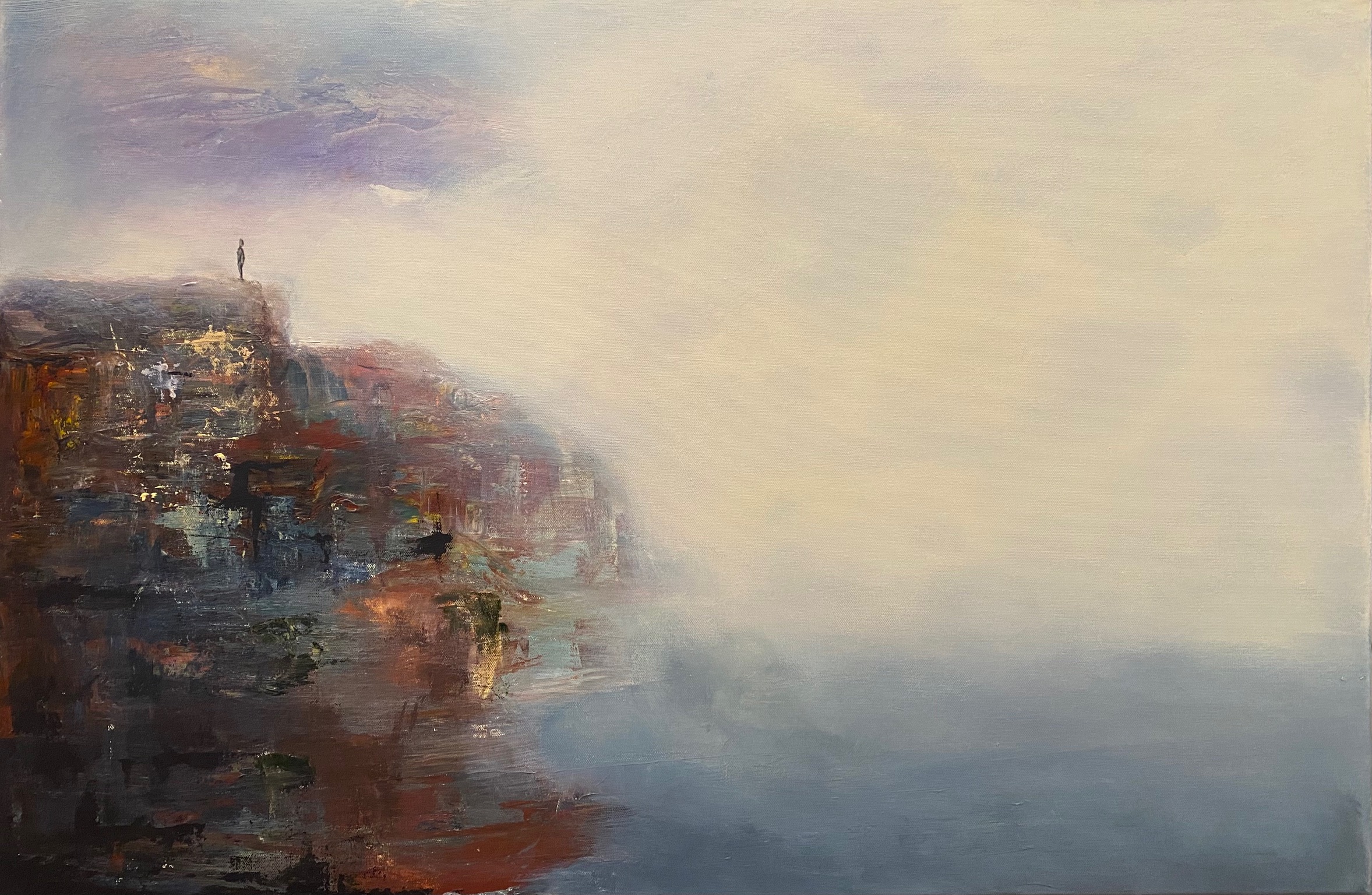Dear friends,
Happy (almost) Easter! I’m delighted to share two invitations with you this week: Lily’s new painting newsletter and a meditation on radical joy even when we catastrophize.
First, Lily is launching a monthly newsletter called Echoes of Time. Each newsletter will feature one of Lily’s beautiful paintings and a very brief meditation. Lily’s work is deeply grounding, healing, and joy-giving. I eagerly invite you to sign up for this monthly gift from Lily and enjoy the sample below.
Second, I recently published an Easter meditation called “Joy: Our Eucatastrophe” with Cultivare. This one meant a lot to me, especially as I reflect on the first anniversary of my dad’s death this month. I’m including it below and hope it nurtures a liberating joy in you as you reflect on Jesus’ death and resurrection this week.
Yours with joy,
Andrew
Echoes of Time by Lily DeCort
“The road goes ever on and on, down from the door where it began.”
J.R.R Tolkien
There is something about vast, open space that stirs the soul. It invites us to pause, to reflect, to stand still before the unknown.
My latest piece captures this feeling, the contrast between vast space and the courage to face it. Inspired by the rugged beauty of Scotland, it speaks to the thrill, fragility, and vulnerability of moments when we stand at the threshold of something larger than ourselves.
May you find peace as you step into the unknown.
If this resonates with you, I invite you to signup for my newsletter Echoes of Time and explore more of my work by visiting this link.
Joy: Our Eucatastrophe by Andrew DeCort
“For the joy set before him he endured the cross.” (Hebrews 12:2)
I realize this is a strange invitation. But for just a moment, try to imagine your life’s most fearsome fate. Go down the rabbit hole of what could go wrong. Catastrophize.
It’s easy to do in our aching world and anxious souls. Here’s one such storyline:
You get born into poverty, violence, and trauma. After losing your home, you grow up watching powerful people kill your friends. Early on, your dad mysteriously disappears.
Still, something different — something beautiful — is alive in you. You love others deeply and give yourself for their flourishing. You become a witness of truth to power, a presence of healing amidst suffering, a sign of hope in the face of despair. You express love in ways that no one had ever imagined before you. Your mother says you are God-sent, and, secretly in your own soul, you know that you are doing what you were born for.
But as your life begins bearing fruit, you aren’t awarded or even wanted. You’re untrusted and held in suspicion. Rumors spread. Your family worries about you. Harassment and death threats hound you. Powerful people and their devotees insist that you’re disloyal, delusional, even dangerous — a threat to God and country.
You begin to feel like something terrible is coming. Your heart rate accelerates. Your body sizzles with anxiety. Frightening scenes flash through your mind. You catastrophize.
Soon enough, it actually happens. You’re arrested by armed men. The people who were supposed to keep you safe condemn you, and your community pushes for the death penalty. They call this “justice” and “God’s will.” Powerless, the police viciously torture you.
And then, you’re executed in public. As you struggle to breathe, your closest friends abandon you, afraid for themselves and disappointed by your failure. The people who stick around ridicule you and relish your suffering. They say God didn’t want you.
At last, with a shriek of grief, you die. And that’s the end of your story. Finished.
***
For me at least, a storyline like that activates some of my deepest fears. Human vulnerability, radical love, and high hopes crash into rejection, abandonment, rage, abuse, shame, terror, violent death. The fruit of being born turns bitter: physical agony, psychological anguish, humiliating powerlessness — then lights out. Why go through with it?
But continue this strange exercise for a moment more:
Imagine that you pass through all of this, but, on the other side, you discover that you’re fully safe and always were.
What you feared would destroy you didn’t. You feel no shame for having suffered and been stripped of everything you once thought you couldn’t live without. In fact, you feel newborn, fully yourself and yet fresher than ever before.
It dawns on you like a blazing sunrise that, after this, you never have anything to fear ever again. You were loved at every moment, shamelessly witnessed in all your suffering, and loved back to life when it all ended. Now you can live entirely in trust, freedom, and hope.
After this, you love life and want to live like never before. You also want others to live, including the ones who made you suffer. In fact, you perceive the great trauma you suffered as a small scar, a cherished sign of your survival. You neither diminish it nor feel like it must be undone; you simply integrate and outgrow it.
Further, something in you knows that the people who did these terrible things to you — and the people whom you yourself have harmed — will also be fine. All regret, resentment, and revenge fall off like flakes of old skin.
You have passed through the very worst, and you are radically okay. In this sacred passage, you have fully integrated the trust that everyone and everything in all of reality is loved, ultimately safe, and destined for healing. As you perceive this, you’re fully grounded but weightless in your body. You feel perfect stillness and full movement, absolutely alone and with everyone who ever lived, infinite silence and like every atom of existence is singing with love.
***
What word might describe this haunting middle passage through ultimate catastrophe to everlasting safety?
I suggest joy.
Joy is the shameless happiness of being held by love. It’s equally the dark good humor of trusting love when we don’t feel it holding us. To the outer edges of the universe and intimately inside the soul, joy is the delightful freedom of accepting that we exist because our Creator loves us, wants good for us, and will ultimately heal us, come what may.
And so, joy sets us free to live, love, and suffer with hope. In our relationships with others, joy is love’s liberation from envy: it celebrates when others succeed and increases with their flourishing. It is love’s pleasure in seeing others shine and love’s reverence in witnessing them suffer with courage.
Together, joy is the side-effect of trusting that we’ll all be okay, even if our catastrophizing comes true. J.R.R. Tolkien called it eucatastrophe, something so overwhelmingly good (eu) that experiencing it can only be described as a good catastrophe — indeed, the ultimate catastrophe, joy “as poignant as grief.”
This joy is the storyline of Jesus. It’s that strange movement from life to death and from death to life that I sketched above, all held in love. At Easter and each moment we’re truly awake, we’re invited to remember that this is the story of God and all reality. It’s our story.
There’s no denial or dissociation in this primal path: catastrophe can strike. In fact, it will, in one way or another. The worst — tragedy, injustice, suffering, heartshatter — very well may happen. And still, we will be okay. Love witnesses us. Love holds us. Love brings us back.
What endures and emerges from the dark tomb of history is joy. It’s like all reality waking up with a burst of eucatastrophic laughter in which all fear, shame, and trauma are held, healed, and shaken off forever. Joy is the shameless, fearless, aggressionless freedom of those who have suffered, lost it all, and survived.
This is what the presence of God produces in us according to Paul, that religious extremist who was converted to love when he met the post-death Jesus. According to Paul, the divine presence that worked this undeathing for Jesus also lives in us. We are these glorious, vulnerable, perennial gardens of this everlasting presence. And thus Paul wrote that the fruit of the Spirit is love and then joy, together growing with freedom (Galatians 5:1, 22).
***
Then and now, we spend much of our lives trying to armor ourselves against catastrophe, to pave over the rabbit holes of our anxiety. But the fruit of divine presence isn’t personal invulnerability, power over others, much less glee in anyone’s suffering. It is that childlike trust that we will all be okay and thus that we can suffer and still seek one another’s wellbeing and delight in our mutual flourishing when it happens. Joy is love’s laughter through tears, the singularity in which death and birth become one.
After Jesus outlived death, an ancient author wrote, “For the joy set before him he endured the cross.” Somehow Jesus could see the invisible cloud of witnesses and shamelessly trust that love held him, even through the catastrophe of rejection, torture, and imperial execution. Joy led him through.
Still today, this is Easter’s strange invitation to joy for all of us: the story of Jesus is the shape of all things and our ultimate inheritance. Yes, it may well get worse before it gets better. Catastrophe is real — poverty, mental illness, a loved one’s death, war, the whole earth going dark. In the end, everyone dies. But even then, the divine presence of love holds us and lives in us.
Joy is set before us as our eucatastrophe. When we open ourselves to this awesome gift, it begins bursting through the hardened soil of our lives with buds of new life and healing fruit for all creation.
What is growing in your garden? What is growing in our communal garden?
To delve deeper into joy, visit Cultivare, Issue 56 | April 2025 where this essay was originally published. I’m grateful to Dr. Duane Grobman, editor of Cultivare, for permission to publish my essay here.





